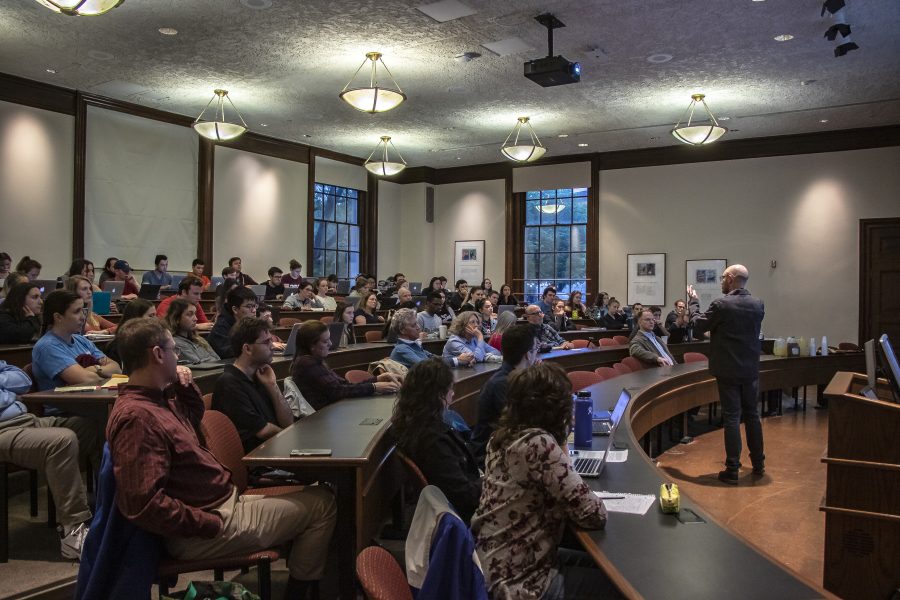“The Holocaust was not only about erasing the physical bodies of Jewish people, but erasing the memories and complete existence of Jewish people and culture,” said Lehigh University history Professor and historian Dr. Nitzan Lebovic. He explained during his talk entitled “Why does the Holocaust matter now?” that this is an important distinction that needs to be incorporated into modern understanding of the genocide.
Lebovic lectured at the college on Wednesday as part of Holocaust Remembrance Week.
In trying to exterminate an entire community and the memories of Jewish people, the Nazis killed any political figure that opposed their political practices regardless of race, Lebovic explained. Homosexuality, mental and physical illnesses were also considered in the genocide.
Lebovic used statistics of people who died: “6 Million Jews, 17 Million victims, including the mentally ill, Homosexuality, and Roma, 7 Million Russian civilians, 2 Millions polish civilians, and ten of thousands from the left.”
The use of science and propaganda were used as systematic dehumanization of the victims, Lebovic said.
“The Nazis, as different survivors and historians tell us…tried to erase the memories of the Jews, not just their bodies,” he said. “We need to understand the motivation behind the Holocaust, we need to understand, not just the physical extermination of 6 million bodies or 17 million people…but we need to understand the motivation, [which] was to erase the culture of a whole group of people.”

A focus on erasure of culture is an important distinction that, in some ways, distinguishes the Holocaust from other horrific mass murders over time, he added.
Lebovic’s field of study mainly focuses on the Holocaust. At Lehigh, he teaches the history of the Holocaust, the history of total war, introduction to modern Jewish culture and the history of fascism. He is also the author on multiple books, such as “The Philosophy of Life and Death: Ludwig Klages and the Rise of a Nazi Biopolitics” (2013) and “Zionism and Melancholy: The Short Life of Israel Zarchi,” which was originally published in Hebrew in 2015, but is scheduled for publication in June 2019 with the “New Jewish Philosophy and Thought” series at Indiana University Press.
Additionally, Lebovic said there were literature with metaphors used as Nazi propaganda about Jewish people being like rats. Those strategies were used to brainwash people into dehumanizing those who were murdered in order to feel less guilty about the massive genocide.
The genocide of millions of people was not to achieve military victory, Lebovic said. The Nazi’s victory was the elimination of the memory of people and an entire culture.
“Victory of [the Nazis] was the elimination of the memory of the Jews—that was their victory, not winning the war. They didn’t care about destroying Germany, that’s why Hitler didn’t actually care about Germany fighting until the last person.”
During the talk, Lebovic used quotes by Primo Levi, who was a Jewish Italian chemist, Holocaust survivor and writer. He wrote many books across genres such as poetry, short story collections, essays and novels.
In Levi’s book “Survival in Auschwitz: The Nazi Assault on Humanity” (1947), he wrote this quote about dehumanization: “We, transformed into slaves, have marched a hundred times backwards and forwards to our silent labours, killed in our spirit long before out anonymous death.”
Lebovic said that through Levi’s body of work about the Holocaust, it shows that he decided to dedicate the rest of his life to capturing the memory of Jewish people.
“The memory is what mattered here, which Primo Levi said, is why he needed to dedicate his life to preserve the memory by giving testimony to what happened, so in that way finding the Nazi’s understanding of victory.”
There are wrong and right ways in which people should remember the Holocaust, according to Lebovic.
“The whole point of the Holocaust was actually that fascism and totalitarianism takes over using democracy, coming from within democracy, people vote for it,” he said. “It’s not just a group of outsiders taking over….again that’s the wrong way of looking at it.”
The right way to “look at it,” he said, is by realizing how democracy actually enables fascists to grow from within. He said that all the examples there are about fascists and genocide taking over, there are “fundamentally” fascists groups using “the weakness of democracy” to take over.
“It is not an outside force,” he added.
Lebovic used a quote by Mark Bray who wrote in his book “Antifa: The Anti-Fascist Handbook” (2017), “It doesn’t take that many fascists to make fascism. Indeed, in both Mussolini’s and Hitler’s cases, the number of party members was quite small–7 to 8% of the overall population in Italy in 1922, 1.3 in Germany in 1933.”
At the Q&A after the lecture Lebovic said that when remembering the Holocaust we can’t “turn it into a fetish, we need to understand the history, rather than celebrating it.”
It goes back to the stereotypical thinking that it’s about “good and evil,” he said. “It’s not just about good and evil, because if it [were]…we might find ourselves in the evil.”
“Good and evil are simplistic ways of looking at the world, and I think you need to understand the historical conditions that actively create certain traumatic experiences,” he added.




































































































